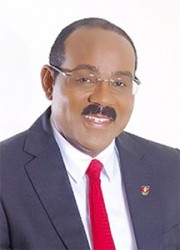The Caribbean Community remains silent as Guyana’s controversial prorogation of Parliament continues into a fourth week.
Both opposition groups, A Partnership for National Unity and the Alliance For Change have written to Caricom, briefing the regional body on President Donald Ramotar’s decision of November 10 to suspend one of the three branches of government – Parliament.
The two groups wrote Caricom officially last week. Stabroek News has made numerous attempts to speak to the Caricom Chairman, Antigua and Barbuda’s Prime Minister Gaston Browne on what he intends to do, to no avail. His office has been unable to say when he would be able to speak to Stabroek News.

Stabroek News has dispatched questions to the Chairman asking if Caricom has any plans to convene a bureau of heads meeting to discuss the prorogation. Stabroek News also asked if the Georgetown-headquartered Caricom has offered any assistance in terms of finding a solution to the political crisis.
When contacted, Browne’s office on Monday stated that a response would be forthcoming, but there has been none as yet.
Leader of the Opposition David Granger has urged that an emergency meeting of Heads of Government of Caricom be convened “to consider a collective approach to the governance crisis in Guyana.” Caricom Secretary General Irwin La Rocque told Stabroek News on Friday that he had received a letter from Granger and AFC leader Khemraj Ramjattan requesting that he bring certain matters to the attention of the Caricom Heads of Government and “I will do so.”
He said that he has already contacted PM Browne – and “the matter is in process.” Asked whether the matter would likely be discussed at the next summit of Caricom Heads of Government, he said that he did not know as there is no agenda yet.
Meanwhile, as it stands the stalemate between the opposition and government remains. Granger formally declined to speak with Ramotar via a letter on Monday. In the letter Granger reiterated the opposition’s stance that there will be no discussions until the prorogation has ended.
Ramotar has held fast to the constitutional propriety of his decision noting that prorogation was the only way to stave off the no-confidence motion by the AFC and continue with the parliamentary agenda. He had stated that during the prorogation, discussions between government and the opposition could occur.
The opposition responded by stating that suspending one of the branches of government then requesting talks was a form of dictatorship.
Granger’s formal rejection of the President’s invite to talk will add to the pressure faced by Ramotar to either reconvene or dissolve the Parliament which would pave the way for fresh general elections. Since the prorogation, various civil society elements have expressed their concerns with many calling for elections to end the deadlock.





